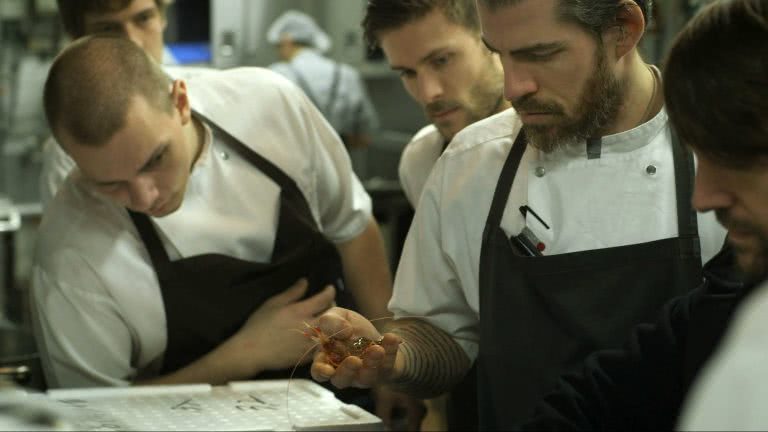★★☆
The pursuit of powerful new flavours inspires radical thinking, and presentation is as important as taste. To simply plate potent ingredients alongside each other is not enough to inspire. Maurice Dekkers’ documentary shows great professionalism, but does not suffice as a hearty meal.
René Redzepi, owner of critically acclaimed restaurant Noma, is about to indulge another flight of fancy, packing up his staff and flying them to Japan to operate a pop-up restaurant for three weeks. Without knowing a word of the language or any of the local ingredients, how will these culinary revolutionaries maintain Noma’s esteemed reputation?
Stakes are established early on, and Dekkers clearly desires drama, but even when facing abject failure, the Noma kitchen staff offer very little. The chefs follow a mantra of failing day after day, and are extraordinarily calm for their occupation. If you’ve ever worked in a kitchen, Redzepi’s soft, straight-faced dismissals will seem wholly alien.
The environment into which our foodies are thrust – a sterile subterranean kitchen – is claustrophobic and grey: not exactly compelling fodder for a camera crew. Despite Japan’s abundance of visual stimuli, we are given very little of the country’s draw. We do not hear from the Japanese themselves, ostensibly to place us in the shoes of the chefs. But why here, why now? In focusing so closely on the cooks, Dekkers has lost the context.
As conflict is thin, the film is thirsty for inspiration, and much like its subjects, it finds it in the forests of Japan. Seeing these oddball Danes scrounge through Nagano wilderness, tasting everything from tree barks to live ants, is a bizarre treat, and one that paints the other flavour destinations – the tourist havens of Tsukiji Fish Market and Okinawa – as unambitious and dry.
Seeing Noma’s creations is a delight, but even this is but a taster. The dishes are smoothly laid out before us with ad-level polish, and whisked away before we can hear the delight of those consuming it, the chink of glasses, the laughter shared by diners. Food in Japan is about shared experience – the izakaya small bars are places that revolve around intimate social engagement. Why, then, should the revelation of Redzepi’s interpretation be so clinical?
Noma’s remarkable chefs travel the world in search of synergy with local foods and cultures, but the documentarian who followed them lacks a matching palette. As such, our time with these artisans is tantalising, but insubstantial. It leaves the heart and the taste buds wanting.
Ants On A Shrimp: Noma In Tokyo was reviewed as part of Sydney Film Festival 2016.

































